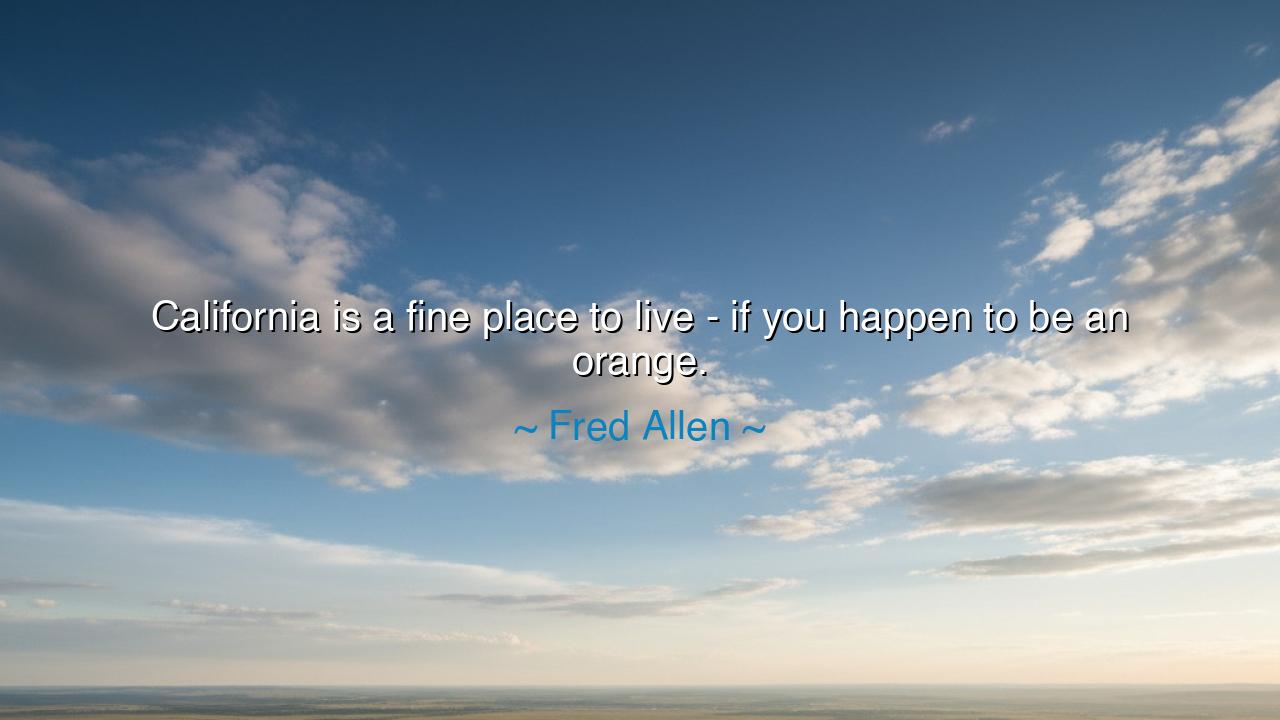
California is a fine place to live - if you happen to be an






In the golden age of radio, when voices carried wit across the airwaves like sparks through the dark, the American humorist Fred Allen spoke with his characteristic blend of satire and sorrow: “California is a fine place to live — if you happen to be an orange.” To the unlistening ear, it is a jest — a mere pun upon the sunshine and the citrus groves of the western land. But to the heart that hears beyond laughter, it is a lament, a quiet commentary on the nature of comfort, belonging, and the illusion of paradise. For in that single line lies a truth as bright as the Californian sun: that a place may appear perfect in nature yet remain inhospitable to the human soul, and that prosperity without purpose is as hollow as a rind without fruit.
The origin of this saying rests in Fred Allen’s own experience as an observer of American ambition. A man of the East — sharp-tongued, world-weary, and wedded to the grit of New York — Allen saw in California the promise of ease and beauty that so many sought, but which so few found. To the orange, bathed in sunlight and nourished by fertile soil, California was indeed paradise. But to the restless seeker of meaning, to the artist or thinker, that same perfection could seem sterile — a land too bright for introspection, too comfortable for struggle, too artificial for authenticity. Thus, his jest becomes a meditation on belonging: that what nourishes one soul may starve another, and that true paradise lies not in the landscape, but in the alignment of one’s inner climate with the outer world.
The ancients would have understood this paradox. Odysseus, when offered immortality by the nymph Calypso on her radiant island, refused. The place was perfect — fragrant, unchanging, eternally bathed in beauty. Yet it was not his home. His heart yearned for Ithaca, harsh and weathered, yet real. Fred Allen’s California is Calypso’s island — a paradise for oranges, but not for mortals. For the soul grows not in eternal ease, but through the friction of imperfection. The orange thrives in sameness; man requires struggle to taste the sweetness of his own becoming.
Yet, Allen’s remark also reveals a subtler critique — one directed not at nature, but at society. By the time he spoke those words, California had become the shimmering symbol of the American dream: wealth without winter, success without sorrow. Its industries — Hollywood and agriculture alike — promised abundance but often delivered artifice. The soil that bore fruit also bore illusions. Many who went west seeking fulfillment found instead a landscape of facades, where smiles were rehearsed and sincerity wilted in the heat of ambition. Thus, Allen’s orange is not only literal, but symbolic: it represents the fortunate few who flourish in a system built for appearance and profit, while others, less adaptable, wither in the pursuit of authenticity.
There is a mirror for this truth in the story of F. Scott Fitzgerald, who journeyed to California after the roaring twenties collapsed into ruin. There he sought renewal, but found only disillusionment — a glittering world that promised success and delivered loneliness. In his letters, he wrote of “the beautiful and the damned” — souls surrounded by luxury yet impoverished in spirit. Like Fred Allen, Fitzgerald discovered that the sunniest places can cast the deepest shadows. The lesson is as timeless as it is tragic: a life rich in circumstance but poor in meaning is no paradise at all.
Still, Allen’s jest is not bitter, but wise. He does not condemn California, nor comfort, nor beauty. He simply reminds us that environment alone cannot complete the human heart. The orange thrives because it asks little — sunlight, water, and soil. Man, however, asks much more: love, truth, creation, struggle, connection. A perfect climate may soothe the body but leave the spirit untested. Thus, Allen’s laughter carries the wisdom of the ancients — that comfort, unearned and endless, can numb the soul as surely as hardship can refine it.
Therefore, O listener, take this as both warning and encouragement. Seek not the paradise that requires no effort, for that paradise belongs to the oranges. Seek instead the soil that challenges you, the air that stings with reality, the sun that burns enough to remind you that you are alive. A life without friction breeds complacency; a soul without weather cannot grow. Choose the climate that awakens you, even if it storms.
So when you hear Fred Allen’s words — “California is a fine place to live, if you happen to be an orange” — smile, but let the smile carry wisdom. For the line is not about geography, but about the human condition. It teaches that comfort, though sweet, is not the same as fulfillment. Let your roots be deep, but your spirit restless. Seek not the endless sun, but the light that makes you grow. For in the end, the finest soil is not the one that flatters you, but the one that shapes you.






AAdministratorAdministrator
Welcome, honored guests. Please leave a comment, we will respond soon